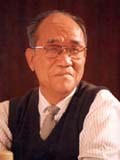| Art Q&A > Quyi |
|
|
Xiangsheng Master: Hou Baolin
He performed at Gulou and Tianqiao in Beijing for a time. In l940, he went to Tianjin, where he made a name for himself. From 1940 he performed for 20 years with Guo Qiru as his partner. Hou Baolin lived in a turbulent period of Chinese history. After the founding of new China, the social status of folk artists rose considerably. Hou joined the Quyi Art Troupe of the Chinese Broadcasting Recitation and Ballad Troupe and enthusiastically plunged into the movement of reforming Xiangsheng by discarding the dross and selecting the essential, so that the contents became more wholesome.
Hou's contributions to the art of Xiangsheng were numerous. First, he took the lead in purifying the language in the scripts by getting rid of vulgarities. He re-edited a lot of traditional scripts and performed them on the stage. Second, he stressed theoretical research into Xiangsheng while creating and performing. He made friends with scholars, and co-authored on the origin of Xiangsheng A Collection of Articles on the Art of Xiangsheng and other works. Third, he wrote some 30 scripts, of which the most representative are Marriage and Superstition, A Miraculous Skill Brings Destruction, Lord Guan Fights Qin Qiong, Opera and Dialect, The Drunkard and The Opera Fan. |
||||
All rights reserved. Reproduction of text for non-commercial purposes is permitted provided that both the source and author are acknowledged and a notifying email is sent to us. |
||||
 |
